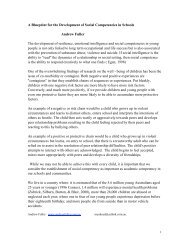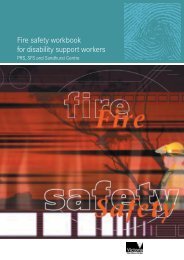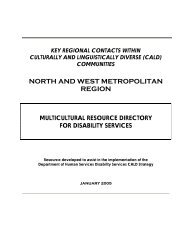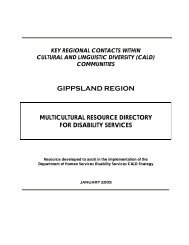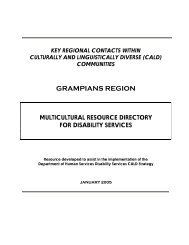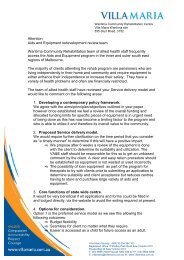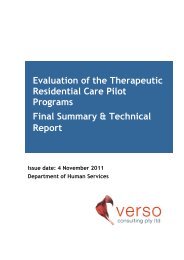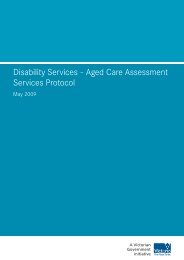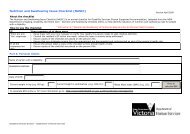Positive Behaviour Support - Department of Human Services - Vic ...
Positive Behaviour Support - Department of Human Services - Vic ...
Positive Behaviour Support - Department of Human Services - Vic ...
You also want an ePaper? Increase the reach of your titles
YUMPU automatically turns print PDFs into web optimized ePapers that Google loves.
PowerPoint 119<br />
PowerPoint 120<br />
*<br />
*<br />
Maintaining self-control<br />
A plan for self-control<br />
<strong>Positive</strong> behaviour support: Getting it right from the start - Facilitators reference manual 87<br />
When you believe you are being threatened with physical injury, your body will prepare to reduce<br />
or eliminate the potential threat. This is a normal reaction and is necessary for survival. Stress<br />
caused by repeated experiences <strong>of</strong> ‘fight or flight’ arousal is cumulative in its effects.<br />
Maintaining self-control in difficult circumstances is one <strong>of</strong> the hallmarks <strong>of</strong> pr<strong>of</strong>essional<br />
behaviour. Therefore developing a series <strong>of</strong> planned techniques for maintaining (or regaining)<br />
control is very important in reducing this stress and restoring emotional balance.<br />
Critical features <strong>of</strong> an effective plan for maintaining self-control<br />
1. Self-assessment: taking a moment to check your own physical state.<br />
2. Know your limits: having a clear picture in your mind <strong>of</strong> how far you might go when you lose<br />
your temper.<br />
3. Regaining self-control: knowing how you feel and what you don’t want to do is a good start. To<br />
be truly effective at self-control, you need to take specific steps to counteract the fight or flight<br />
response. For example if you find that you breathe very rapidly when you are frightened, your<br />
self-control plan would include a conscious effort to breathe slowly and deeply.<br />
4. Restoration and healing: being threatened or physically injured creates emotional stress.<br />
Since emotional stress makes it more difficult for you to stay calm and controlled, it is important<br />
for you to plan methods for restoring your emotional balance after an episode. Talking with a<br />
trusted friend is one <strong>of</strong> the most common ways <strong>of</strong> beginning to restore emotional balance.<br />
Since we are each unique individuals, no one way <strong>of</strong> emotional restoration will work for every<br />
individual. It is important for you to understand what you can do to make yourself feel better<br />
after a stressful incident. Emotional balance is essential for good pr<strong>of</strong>essional performance.<br />
Complete the plan for self- control



